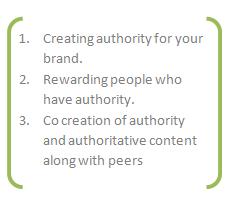Social Authority Marketing- Getting deeper into Social Media!
We all know that at the heart of Social Networks is ‘Conversations’. But have we thought why do we converse
Of course, conversation is critical to co-create and share and that’s why we converse. But it seems there are deeper meanings and implications of conversations.
Our endeavour to understand these hidden meanings will unveil the paths that marketers can tread to use Social Networks even more effectively.
Social Media is all about collaborated creation, consumption and distribution of content. And this is not possible without communication or conversations.
I believe that the reason why we communicate with others is to exert ‘authority’, to control, manipulate or influence!
My theory is that all human beings (and perhaps all animals too) have a persistent need to manipulate others or to exert authority on others.
For e.g., a child cries loudly if she doesn’t want to go to school, and tries to exert authority such that the parents are influenced and agree to her.
In a boardroom- the CEO’s body language exerts authority and influences the Sales Head to re-look at the numbers and be soft on shifting the targets north.
If you notice, we try and exert our authority to influence our peers and social group every minute- often without speaking and sometimes without consciously knowing about it.
The same behaviour is also replicated online -within Online Social Networks.
Have you ever come across a conversation where someone in the group says that he or she is thinking of buying a laptop or a car, and many people immediately post their recommendations?
All of them knowingly or unknowingly try to influence the prospective buyer.
The Buyer in turn does get influenced; but by the person or group of people who has/have the most authority.
This implies that in a group or a social network, everyone is communicating to exert authority in order to influence others- there are people who would end up having more authority and hence the culture of the group gets manipulated and is co-created by people with authority and their followers.
People who feel left out or fear getting influenced leave and create another network where their authority is prime.
Authority is earned. It takes time to build authority. A person who over a period of time exudes
expertise and knowledge coupled with consistency and relevance for others in peer group, earns followers or fans, and continues to create his authority.
Further more, as human beings we want someone to influence us- whether we believe it or not- our actions are defined by the stimulus we receive from external world in the form of sight, sound, taste, feel, and what we hear.
These stimuli are weighted (the more trustworthy a source the more authority he will have) and lead us to behave in a certain way.
It’s also important to understand that Authority is a function of-
1. Personal Expertise and Knowledge in a certain category
2. Use of expertise and knowledge to create, share content that is relevant and useful to the peer
group and allows the peer group to take winning decisions and
3. A circle of fans/followers/friends who also have expertise , knowledge or interest in that
category
Authority is built over time and Authority can be challanged.
Again, difficult to believe but the child in the above example has more authority than ‘parents’ at a certain moment in time- to be able to almost dictate terms from a seat of power. (Her authority may get challanged after some time and we can find a role reversal- when Parents act tough and show who has the authority)
So, What is in store for marketers?
Authority is a ‘keyword’ here. Marketers need to be aware of 2 things:
1. They need to create brands which exude authority in the Social Networks
2. They need to reach out to people in the social networks who have the authority to influence
others.
That’s why Social Media Marketing is much more than just creating engagement . While marketers need to engage they must simultaneously observe the people with authority, and create strategies to win them and create ambassadors out of them.
As shown in the above diagram- A = f(t, k, r, rcg, c) { meaning- Authority is a function of Trust, Knowledge, Expertise, Relevance and Recognition) and this function defines a Social Networks’ Culture, Conversation and members’ actions.
For analogy this is very similar to Earth’s Iron Core, which defines earth’s magnetic field and eventually earth’s existence. Similarly ‘Authority’ defines the culture of the group and actually is the core of a Group or Social Network- almost always you can observe and find that a group is run by a core group or single person with highest authority.
Marketers need to recognize and reward the people with authority. Marketers need to back them. Marketers need to collaborate with them and create authority for themselves. Marketers need to co-create the relevant content for the social networks.
Marketers cannot of course bribe them because a person with doubtful credentials will loose authority in no time and hence will be of no use to marketers. Also, marketers’ own reputation will be at stake if people who they back loose credentials
To conclude, Social Authority Marketing is about:
A complex yet interesting subject, but the time has come when we go deeper into Social Media Marketing and look at newer nuances like SAM (Social Authority Marketing). Keep coming back , we shall talk more on this new and explorable concept,. Also drop in a few lines on what is your take on this!
Image Courtsey: http://www.zazzle.com







